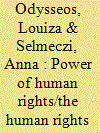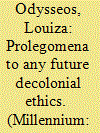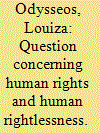|
|
|
Sort Order |
|
|
|
Items / Page
|
|
|
|
|
|
|
| Srl | Item |
| 1 |
ID:
139763


|
|
|
|
|
| Summary/Abstract |
The contributions to this volume eschew the long-held approach of either dismissing human rights as politically compromised or glorifying them as a priori progressive in enabling resistance. Drawing on plural social theoretic and philosophical literatures – and a multiplicity of empirical domains – they illuminate the multi-layered and intricate relationship of human rights and power. They highlight human rights’ incitement of new subjects and modes of political action, marked by an often unnoticed duality and indeterminacy. Epistemologically distancing themselves from purely deductive, theory-driven approaches, the contributors explore these linkages through historically specific rights struggles. This, in turn, substantiates the commitment to avoid reifying the ‘Third World’ as merely the terrain of ‘fieldwork’, proposing it, instead, as a legitimate and necessary site of theorising.
|
|
|
|
|
|
|
|
|
|
|
|
|
|
|
|
| 2 |
ID:
153672


|
|
|
|
|
| Summary/Abstract |
Decolonial thought has wrought a devastating critique on the Academy and wide-ranging fields within it. Decolonial critique entails undeniable and multiple ethico-political orientations arising from concrete struggles within the ‘unfinished project of decolonization’ (Maldonado-Torres), as well as recent articulations of decolonial ethics. This article argues that, as decolonial critique, and calls for decolonial ethics, begin to find their way into broader theoretical discussions in the social sciences and humanities, it may be more fruitful to insist on the question of decolonial ethics. It encourages retaining the disruptive potential of decolonial critique by resisting its immediate translations into available ethical registers and traditions that unwittingly reassert, and remain bound to, forms of ethical expression dependent on generalised narratives, which occlude their histories of violent and racialised exclusion and masterful figurations of ethical subjectivity. Outlining Sylvia Wynter’s excavation of prominent figurations of the human as ‘Man’, I argue that our conceptions of ethical subjects too rest on such figurations. The article, therefore, discusses three prolegomena to any future decolonial ethics: the decolonial critique and displacement of the figure of ‘Man’ as ethical subject within racialised coloniality; the development of a decolonising poetics, whose ethos of irreverence seeks forms of poetic revolt that draw on struggles to question systems of ethical thought and knowledge; finally, a discussion of the contours of a praxis of being hybridly human through the development of ‘education’ as an incessant and ‘unfinished’ project.
|
|
|
|
|
|
|
|
|
|
|
|
|
|
|
|
| 3 |
ID:
139764


|
|
|
|
|
| Summary/Abstract |
In the midst of concerns about diminishing political support for human rights, individuals and groups across the globe continue to invoke them in their diverse struggles against oppression and injustice. Yet both those concerned with the future of human rights and those who champion rights activism as essential to resistance, assume that human rights – as law, discourse and practices of rights claiming – can ameliorate rightlessness. In questioning this assumption, this article seeks also to reconceptualise rightlessness by engaging with contemporary discussions of disposability and social abandonment in an attempt to be attentive to forms of rightlessness co-emergent with the operations of global capital. Developing a heuristic analytics of rightlessness, it evaluates the relatively recent attempts to mobilise human rights as a frame for analysis and action in the campaigns for justice following the 3 December 1984 gas leak from Union Carbide Corporation’s (UCC) pesticide manufacturing plant in Bhopal, India. Informed by the complex effects of human rights in the amelioration of rightlessness, the article calls for reconstituting human rights as an optics of rightlessness.
|
|
|
|
|
|
|
|
|
|
|
|
|
|
|
|
| 4 |
ID:
167416


|
|
|
|
|
| Summary/Abstract |
Joining the discussion of revolution and resistance in world politics, this article puts forward the idea of poetic revolt as a necessary companion to these terms, one which centres attention on the ongoing reverberations of transatlantic slavery – what have been called its ‘afterlives’ (Saidiya Hartman, Édouard Glissant). Engaging with contributions to poetics, black studies and black feminist thought, it first develops a theoretical orientation of the ongoingness of slavery as a ‘grammar of captivity’ (Hortense Spillers) that ‘wake work’, a term proposed by Christina Sharpe, aims to disrupt. The article calls for methodological attention to the fugitive and wayward arts and acts of living, that is, what Sylvia Wynter and Fred Moten call the ‘sociopoetic’ practices of enslaved and legally-emancipated populations to illuminate the simultaneity and entanglement of structuring violence and poetic revolt. Second, drawing on Spillers’ scholarship on homiletics – the study of and participation in sermons – in particular United States contexts, it identifies and discusses three aspects of poetic revolt: ‘fabulation’, world-making otherwise and resignification, through which such communities developed a critical and insurgent posture aimed at rupturing this grammar of captivity and at forging critical, futurally-oriented sociabilities. Third, in conclusion, it discusses the links of poetic revolt, in its specificity in Atlantic slavery, to wider systemic critique. Pluralising our thinking on revolution and resistance, poetic revolt, it argues, is best seen as a critical meditation on futurity.
|
|
|
|
|
|
|
|
|
|
|
|
|
|
|
|
| 5 |
ID:
157854


|
|
|
|
|
| Summary/Abstract |
Anxieties regarding colonial and neoliberal education have generated multiple calls for critical international pedagogies. Scholars of critical pedagogy have analyzed the pedagogies of the neoliberal project, whose ethos and economic imperatives aim to produce apolitical consumers and future citizens. Such calls, this article argues, articulate a concern about other-regardedness, critiquing the impact of neoliberalism on the cultivation of student values and relations toward politics, society, and others. How can we articulate a critical international pedagogy informed by, and enhancing, students’ and future citizens’ other-regardedness toward those “superfluous” and “disposable” others outside the classroom and the formal curriculum? To this end, we mobilize Michel Foucault’s thinking of “counter-conduct” to illuminate how students resist being conducted as self-interested and apolitical consumers. Such practices remain largely unexplored in examinations of recent student protests and occupations. Examining the 2005 student occupation of a French university against the local government’s abandonment of asylum-seekers, we discuss students’ own processes of social participation and self-formation, thus exploring the possibilities and tensions for advancing a critical and other-regarding pedagogy. Greater attention to students resisting the historically blind and market-driven rationalities and techniques of governing—inside and outside classrooms and curricula—marks an important point of departure for critical pedagogies of the international.
|
|
|
|
|
|
|
|
|
|
|
|
|
|
|
|
|
|
|
|
|